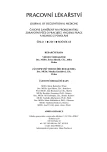-
Medical journals
- Career
Boušová K., Kučera I.: Acute intoxication with cyanides at work
Authors: K. Boušová 1; I. Kučera 2
Authors‘ workplace: Klinika nemocí z povolání, Lékařská fakulta Univerzity Karlovy a Fakultní nemocnice v Hradci Králové, přednosta doc. MUDr. Jiří Chaloupka, CSc. 1; Krajská hygienická stanice Královéhradeckého kraje, ředitel MUDr. Ivan Kučera, Ph. D. 2
Published in: Pracov. Lék., 63, 2011, No. 1, s. 29-33.
Category: Case Studies
Overview
The professional intoxication with cyanides, ones of the most toxic chemicals at all, occurs very rarely. Cyanides are used in metallurgy, mining industry for extraction of gold and silver from minerals, in chemical and photographic industry and in production of plastic materials, rubber, explosives and fumigators. Sodium and potassium cyanides are used in galvanizing shops for electrochemical metal-plating and hardening of steel and in jewellery for gilding metals. Intoxications are mainly accidental at work with cyanides in chemists, photographers and galvanizers. Firemen and rescuers are significantly endangered during fires of buildings.
The authors present a case study of intoxication with cyanides in two persons during so called gasing of the mill due to deratization and desinsection. One person have been rescued, the second one died. The paper summarizes the principles of therapy incl. particular guidelines for using antidotes and reminds the principles of safety at work with hydrocyanic acid and cyanides.Key words:
professional intoxication with cyanides, hydrocyanic acid, prevention of industrial intoxications
Sources
1. Ekotoxikologická databáze: www.piskac.cz/ETD
2. http://cs.wikipedia.org/w/index.php.Kyanid_draselny
3. http://kugita.wordpress.com/2008/12/31/maniok-jedly-manihot-esculenta/
4. Integrovaný registr znečišťování: www.irz.cz/latky/kyanidy
5. Nemoci z povolání v České republice, Registr nemocí z povolání. Dostupné na www.szu.cz
6. www.biotox.cz/toxikon/anorgan
7. www.firegroup.cz
8. Seznam nemocí z povolání, Příloha k Nařízení vlády č. 290/199, sbírka zákonů České republiky.
9. CUMMINGS, T. F. The treatment of cyanide poisoning. Occupational Medicine, 2004, 54, č. 2, s. 82–85.
10. GUIDOTTI, T. Acute cyanide poisonong in prehospital care: new challenges, new tools for intervention. Prehosp. Disaster Med., 2006, 21, č. 2, s. 40–48.
11. LAM, K. K., LAU, F. L. An incident of hydrogen cyanide poisonong. Am. J. Emerg. Med., 2000, 18, č. 2, s. 172–175.
12. NEKLAPILOVÁ, V. Otrava kyanovodíkem z inhalace kouře. Výtah z přílohy časopisu SMOKE, Informační středisko medicíny katastrof. Dostupné na: www.unbr.cz
13. PELCLOVÁ, D., FILIPOVÁ, J., NEUWIRTHOVÁ, H. Nejčastější otravy a jejich terapie. Praha: Galén, 2000, 96 s.
14. VARONE, J. C., WARREN, T. N., JUTRAS, K. et al. Report of the investigation committee into the cyanide poisonings of Providelnce Firefighters. New Solut, 2008, 18, č. 1, s. 87–101.
Labels
Hygiene and epidemiology Hyperbaric medicine Occupational medicine
Article was published inOccupational Medicine

2011 Issue 1-
All articles in this issue
- Buchancová J., Švihrová V., Gáliková E., Osina O.: A study on occurrence of calcifications in lungs in silicosis – broncholithiasis and lithopthysis in silicosis
- Švihrová V., Buchancová J., Palúch A., Turská A., Hudečková H., Avdičová M., Legáth Ľ.: Analysis of costs on economically active patients hospitalized with the diagnosis of professional and nonprofessional tick encephalitis in Slovakia
- Nakládalová M., Vévoda J., Ivanová K., Marečková J.: Work satisfaction of general nurses at hospital inpatient departments
- Lipšová V., Kožená L.: Healthy Enterprise competition – findings from the 2005–2010
- Boušová K., Kučera I.: Acute intoxication with cyanides at work
- Petrik V.: Contracting malaria notified as an occupational disease
- Occupational Medicine
- Journal archive
- Current issue
- Online only
- About the journal
Most read in this issue- Boušová K., Kučera I.: Acute intoxication with cyanides at work
- Buchancová J., Švihrová V., Gáliková E., Osina O.: A study on occurrence of calcifications in lungs in silicosis – broncholithiasis and lithopthysis in silicosis
- Petrik V.: Contracting malaria notified as an occupational disease
- Nakládalová M., Vévoda J., Ivanová K., Marečková J.: Work satisfaction of general nurses at hospital inpatient departments
Login#ADS_BOTTOM_SCRIPTS#Forgotten passwordEnter the email address that you registered with. We will send you instructions on how to set a new password.
- Career

